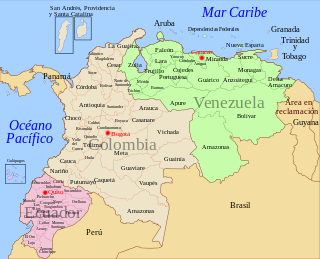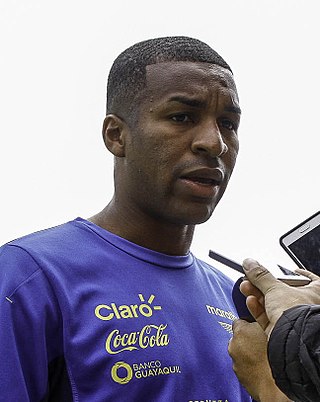
Ecuador, officially the Republic of Ecuador, is a country in northwestern South America, bordered by Colombia on the north, Peru on the east and south, and the Pacific Ocean on the west. Ecuador also includes the Galápagos Islands in the Pacific, about 1,000 kilometers (621 mi) west of the mainland. The country's capital is Quito, but its largest city is Guayaquil.

The Ecuadorian Armed Forces is the national military force of Ecuador. The commander-in-chief is the President of Ecuador. The military is generally under civilian control, specifically the Ministry of National Defence. The Ecuadorian military of Ecuador has been involved in border disputes with Peru, and has provided military observers and troops to the United Nations since 1948.

The Peruvian Armed Forces are the military services of Peru, comprising independent Army, Navy and Air Force components. Their primary mission is to safeguard the country's independence, sovereignty and territorial integrity against any threat. As a secondary mission they participate in economic and social development as well as in civil defense tasks.

The Cenepa War or Fourth Ecuadorian-Peruvian War, also known as the Alto Cenepa War, was a brief and localized military conflict between Ecuador and Peru, fought over control of an area in Peruvian territory near the border between the two countries. The two nations had signed a border treaty following the Ecuadorian–Peruvian War of 1941, but Ecuador later disagreed with the treaty as it applied to the Cenepa and Paquisha areas, and in 1960 it declared the treaty null and void. Most of the fighting took place around the headwaters of the Cenepa River.

The Second Ecuadorian–Peruvian War, known locally as the War of '41, was a South American border war fought between 5–31 July 1941. It was the first of three military conflicts between Ecuador and Peru during the 20th century.

Jorge Jamil Mahuad Witt is an Ecuadorian lawyer, academic and former politician. He was the forty-first president of Ecuador from 10 August 1998 to 21 January 2000.

The Ecuadorian Army is the land component of the Ecuadorian Armed Forces. Its 24,000 active soldiers are deployed in relation to its military doctrine. The contemporary Ecuadorian Army incorporates many jungle and special forces infantry units into its structure.

Lenín Boltaire Moreno Garcés is an Ecuadorian politician who served as the 46th president of Ecuador, from 2017 to 2021. Moreno was vice president from 2007 to 2013, serving under President Rafael Correa.

The Revolutionary and Democratic Ethical Green Movement (MOVER, Spanish: Movimiento Verde Ético Revolucionario y Democrático) is a centre to centre-right neoliberal and environmentalist political party in Ecuador. In 2016, it had 979,691 members. Until 2021 it was known as the PAIS Alliance (Proud and Sovereign Homeland) (PAIS, Spanish: Alianza PAIS (Patria Altiva i Soberana)).

The 2008 Andean diplomatic crisis was a diplomatic stand-off between the South American countries of Ecuador, Colombia and Venezuela. It began with an incursion into Ecuadorian territory across the Putumayo River by the Colombian military on March 1, 2008, leading to the deaths of over twenty militants, including Raúl Reyes and sixteen other members of the Revolutionary Armed Forces of Colombia (FARC). This incursion led to increased tension between Colombia and Ecuador and the movement of Venezuelan and Ecuadorian troops to their borders with Colombia.
Lebanese Ecuadorians are Ecuadorians who are descended from migrants from Lebanon. There are approximately 100,000 Lebanese people and their descendants living in Ecuador.

Operación Fénix, was an attack by the Colombian military against a camp of the guerrilla group the Revolutionary Armed Forces of Colombia (FARC) 1.8 kilometers (1.1 mi) over the border in Sucumbíos Province, Ecuador on March 1, 2008. The raid succeeded in killing Raúl Reyes, second-in-command of FARC, as well as some two dozen individuals present in the encampment, including an Ecuadorian citizen and four Mexicans, allegedly research students invited to the camp after attending a Bolivarian congress in Quito. In the aftermath of the attack, a diplomatic crisis emerged between Ecuador, Colombia, and Venezuela.
Ecuador is a country in South America.

The 2010 Ecuadorian crisis took place on 30 September 2010, when National Police operatives blockaded highways, occupied the National Assembly, blocked Mariscal Sucre International Airport in Quito and José Joaquín de Olmedo International Airport in Guayaquil, and took control of the premises of Ecuador TV, in what they claimed was a strike to oppose a government-sponsored law that supposedly reduced their benefits. Unrest and looting were reported in seven provinces of the country because of the lack of law enforcement.

Frickson Rafael Erazo Vivero is a retired Ecuadorian professional footballer who played as a centre back for Club 9 de Octubre. He is a member of the Ecuador national team.
Los Choneros is an organized crime syndicate and drug cartel based in the city of Guayaquil, Ecuador, with a notable presence along much of the country's coastline. The gang is known for its involvement in organized crime, including drug trafficking, extortion, and robbery. Many of its members have been on the Ecuadorian most wanted list and its original leaders have been imprisoned or killed. Their main business is moving cocaine to the United States.
Events in the year 2024 in Ecuador.

On 9 January 2024, an armed conflict broke out in Ecuador involving the country's government against several organized crime groups, most notably the Los Choneros cartel.

The Ecuadorian Drug War is an internal conflict in Ecuador waged by the Ecuadorian security forces against criminal groups since the beginning of 2018. The conflict is divided into two parts, the first is the Ecuadorian government against satellite groups of the Jalisco New Generation Cartel and Sinaloa Cartel, and the second is the confrontation between said satellite groups for dominance and hegemony.

The attacks on the northern border of Ecuador in 2018 were a series of terrorist attacks that took place in the towns of San Lorenzo, Mataje and Viche in the Esmeraldas Province, Northern Ecuador. The attacks began on January 7, 2018, outside the facilities of the San Lorenzo National Police district where, in the early morning hours, a car bomb exploded leaving 28 people injured, as well as severe damage to the infrastructure of the police precinct and 37 homes in the vicinity. In preliminary investigations, Ecuadorian authorities linked this incident to criminal organizations linked to drug trafficking and the illegal drug trade.















